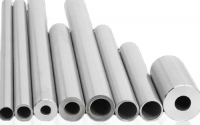From Construction to Aerospace: The Versatile Applications of Molybdenum in Steel
Molybdenum is a rare and valuable metal that has become increasingly important in modern manufacturing. With its unique properties, molybdenum has found its way into various industries, including construction, automotive, aerospace, power generation, and chemical processing. This versatile metal is commonly used as an alloying agent in steel production, where its high melting point, high strength, and excellent corrosion resistance make it an ideal material for a wide range of applications. In this article, we will explore the various ways molybdenum is used in steel production and how it has contributed to the success of different industries. We will also dive into the benefits of using molybdenum in steel and why it is considered a valuable material in modern manufacturing.
The Role of Molybdenum in Steel
Molybdenum is an essential component of many types of steel. It is commonly used as an alloying agent to increase the strength, hardness, and toughness of steel. This metal has a high melting point of 2,623 degrees Celsius, which makes it an excellent material for high-temperature applications. Molybdenum also has excellent corrosion resistance, which makes it an ideal material for use in harsh environments.
Molybdenum is typically added to steel at a concentration of 0.25% to 8%, depending on the desired properties of the steel. The addition of molybdenum can improve the mechanical properties of steel, such as tensile strength, yield strength, and hardness. Molybdenum can also improve the corrosion resistance of steel, making it suitable for use in harsh environments, such as chemical processing plants, oil and gas pipelines, and marine applications.
Molybdenum is also used in the production of high-strength low-alloy (HSLA) steel, which is used in the construction of bridges, buildings, and other infrastructure. HSLA steel typically contains small amounts of molybdenum, which can improve the strength and toughness of the steel while maintaining its weldability and formability.
Molybdenum in Construction Industry
The construction industry is one of the largest consumers of molybdenum in the world. Molybdenum is used in the production of high-strength steel, which is used in the construction of bridges, buildings, and other infrastructure. Molybdenum can improve the strength and toughness of steel, which makes it an ideal material for use in the construction industry.
Molybdenum is also used in the production of stainless steel, which is commonly used in the construction of hospitals, laboratories, and other facilities where hygiene is critical. Stainless steel is highly resistant to corrosion, which makes it an ideal material for use in these applications.
Molybdenum is also used in the production of rebar, which is used to reinforce concrete structures. Rebar is typically made of low-alloy steel, which contains small amounts of molybdenum to improve its strength and corrosion resistance.
Molybdenum in Automotive Industry
The automotive industry is another major consumer of molybdenum. Molybdenum is used in the production of high-strength steel, which is used in the construction of car bodies and other components. Molybdenum can improve the strength and toughness of steel, which makes it an ideal material for use in the automotive industry.
Molybdenum is also used in the production of exhaust systems, which are subject to high temperatures and corrosive environments. Stainless steel containing molybdenum is often used to make exhaust systems, as it is highly resistant to corrosion and can withstand high temperatures.
Molybdenum is also used in the production of catalytic converters, which are used to reduce emissions in automobiles. Catalytic converters are typically made of stainless steel containing molybdenum, which can withstand the high temperatures and corrosive environments in the exhaust system.
Molybdenum in Aerospace Industry
The aerospace industry is one of the most demanding industries in terms of materials performance. Molybdenum is used in the production of high-strength steel, which is used in the construction of aircraft frames, landing gear, and other components. Molybdenum can improve the strength and toughness of steel, which makes it an ideal material for use in the aerospace industry.

Molybdenum is also used in the production of turbine blades, which are subject to high temperatures and corrosive environments. Molybdenum can improve the heat resistance and corrosion resistance of steel, which makes it an ideal material for use in turbine blades.
Molybdenum is also used in the production of rocket engines, which require materials that can withstand extreme temperatures and pressures. Molybdenum can improve the heat resistance and strength of steel, which makes it an ideal material for use in rocket engines.
Molybdenum in Power Generation Industry
The power generation industry is another major consumer of molybdenum. Molybdenum is used in the production of high-strength steel, which is used in the construction of power plants, pipelines, and other components. Molybdenum can improve the strength and toughness of steel, which makes it an ideal material for use in the power generation industry.
Molybdenum is also used in the production of nuclear reactors, which require materials that can withstand extreme temperatures and radiation. Molybdenum can improve the heat resistance and strength of steel, which makes it an ideal material for use in nuclear reactors.
Molybdenum is also used in the production of wind turbines, which require materials that can withstand high loads and corrosive environments. Molybdenum can improve the strength and corrosion resistance of steel, which makes it an ideal material for use in wind turbines.
Molybdenum in Chemical Processing Industry
The chemical processing industry is another major consumer of molybdenum. Molybdenum is used in the production of stainless steel, which is highly resistant to corrosion and can withstand harsh chemical environments. Stainless steel containing molybdenum is often used in the construction of chemical processing plants, oil and gas pipelines, and other applications where corrosion resistance is critical.
Molybdenum is also used in the production of catalysts, which are used to speed up chemical reactions in the production of chemicals and fuels. Molybdenum-based catalysts are highly effective and can withstand high temperatures and pressures.
Molybdenum Market Trends and Demand
The demand for molybdenum has been increasing in recent years, driven by the growth of various industries, such as construction, automotive, aerospace, power generation, and chemical processing. The global market for molybdenum was valued at $4.9 billion in 2020 and is expected to grow at a compound annual growth rate (CAGR) of 3.8% from 2021 to 2028.
The largest producers of molybdenum are China, the United States, and Chile. These countries account for more than 85% of global molybdenum production. The demand for molybdenum is expected to continue to grow in the coming years, driven by the expansion of various industries and the increasing demand for high-performance materials.
Challenges in Molybdenum Production
The production of molybdenum is a complex process that requires specialized equipment and expertise. The mining and processing of molybdenum can be challenging, as the metal is often found in low concentrations and mixed with other minerals. The production of molybdenum also requires the use of large amounts of energy and water, which can have environmental impacts.
Another challenge in molybdenum production is the limited availability of high-quality molybdenum. The demand for molybdenum has been increasing in recent years, which has led to the development of new sources of molybdenum. However, the quality of these new sources is often lower than that of traditional sources, which can affect the performance of the final product.
Conclusion
Molybdenum is a versatile and valuable metal that has found its way into various industries, including construction, automotive, aerospace, power generation, and chemical processing. Molybdenum is commonly used as an alloying agent in steel production, where its high melting point, high strength, and excellent corrosion resistance make it an ideal material for a wide range of applications. The demand for molybdenum is expected to continue to grow in the coming years, driven by the expansion of various industries and the increasing demand for high-performance materials. However, the production of molybdenum can be challenging, and there are limitations to the availability and quality of molybdenum sources. Despite these challenges, molybdenum remains a valuable material in modern manufacturing, and its unique properties continue to contribute to the success of different industries around the world.
For more information about high-quality molybdenum products, please visit https://www.samaterials.com/.



